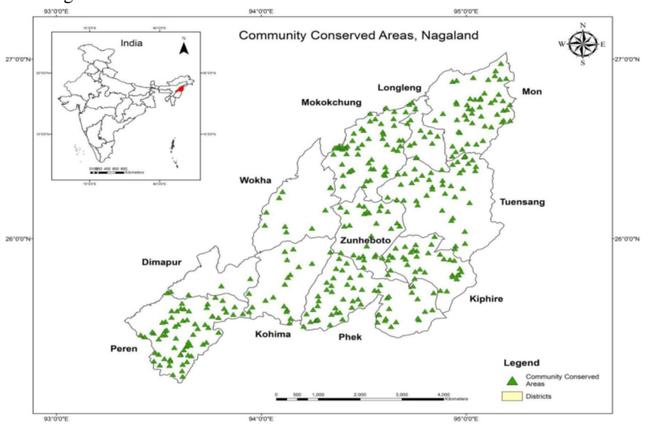Four village councils in the Sendenyu area of Nagaland’s Tseminyu district have initiated a movement against the Forest (Conservation) Amendment Act, 2023, passed in Parliament on August 2.
These village councils (VCs) of the Rengma Naga community have appealed to the VCs of all Naga tribes across Nagaland to take up the matter of “great urgency and imminent crisis” to create pressure on the State government so that the 60-member Assembly rejects the Act.
The four VCs cover the Sendenyu, New Sendenyu, Thongsunyu, and Lostuphen villages.
On August 12, the members of these four VCs pledged to oppose the Act “designed against the interests of the indigenous communities” to ensure that the “rights bestowed by our ancestors do not go in vain in the name of so-called national importance and security”.

The Act, the VCs pointed out, also challenges the “very essence of traditional customary and indigenous ownership-rights of the people over their land and forest” as guaranteed by Article 371A of the Constitution of India.
Alarmed by the rapid decline of fauna and flora species in the region, the people of the villages in the Sendenyu area resolved to start community biodiversity conservation by unanimously passing The Sendenyu Village Wildlife Conservation Act of 2001.
The villages subsequently donated their clan and private lands for community conservation to form a wildlife and biodiversity corridor of about 22 sq. km (2,200 hectares), which was resolved to be managed by Sendenyu Community Biodiversity and Wildlife Conservation Board. Less than 5% of forest land in Nagaland belongs to the State government.
“As a result of our continued efforts, our biodiversity conservation area has not resulted in an increase in the population of flora and fauna but also led to the recording of a new amphibian, Ichthyophis sendenyu, now featuring on the IUCN Red List of threatened species,” Gwasinlo Thong, the chairman of Sendenyu Community Biodiversity and Wildlife Conservation Board told The Hindu.
Resolution against Act
The four VCs resolved that the Act undermined the sacrifices of the community, discriminated against, and discouraged the efforts of the true custodians of Nagaland’s forestland by enabling arbitrary diversion by the Central government without obtaining prior consent from village councils and the local district authority.
According to the current provision of the Act, the whole of Nagaland and its forests fall within 100 km of the international (Myanmar) boundary giving the Centre the arbitrary power for diversion.
“We appeal to the VCs of fellow Naga tribes across the State to take this issue as a matter of great urgency and imminent crisis so that the Act can be rejected by the Nagaland Assembly, and the rights bestowed by our ancestors do not go in vain in the name of so-called national importance and security,” the resolution read.

The VCs also endorsed the concerns of the Nagaland Community Conservation Area Forum (NCCAF) over the Act, which it called unconstitutional, undemocratic, and unacceptable.
“There is a huge ambiguity over the definitions and provisions of the Act, putting the rights and security of the people at state,” NCCAF chairman Heirang Lungalang said.
He pointed out that communities in Nagaland have voluntarily come forward to take up conservation practices in their traditional ancestral lands to sustain and preserve the rich biodiversity resulting in the recognition and documentation of over 407 community-conserved areas in the State, one of the world’s top biodiversity hotspots.







